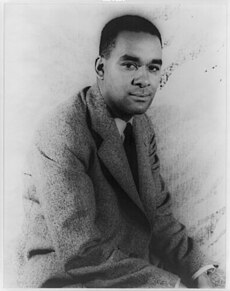Richard Wright (escritor)
Richard Nathaniel Wright, conhecido como Richard Wright, (Mississipi, 4 de Setembro de 1908 - Paris, 28 de novembro de 1960) foi um escritor estadunidense que lutou contra o racismo nos Estados Unidos nos anos 20 por meio de suas obras.
| Richard Wright | |
|---|---|
 | |
| Nome completo | Richard Nathaniel Wright |
| Nascimento | 4 de setembro de 1908 Mississipi, Estados Unidos |
| Morte | 28 de novembro de 1960 (52 anos) |
| Nacionalidade | estadunidense |
| Cônjuge | Dhimah Rose Meidman (1939-1940); Ellen Poplar (1941-1960, 2 filhas) |
| Ocupação | escritor |
| Magnum opus | Os filhos do pai Tomás |
Um dos seus livros mais renomados foi escrito nos Estados Unidos, Black Boy.
Richard Wright é retratado no livro de James Campbell.
Biografia
editarRichard Nathaniel Wright nasceu a 4 de Setembro de 1908, na Plantação Rucker, entre a cidade ferroviária de Roxie e a cidade ribeirinha de Natchez, Mississippi.
Foi para Paris com a ajuda da escritora Gertrude Stein. Depois fica morando na França com a família.
Após a sua morte, Richard Wright foi cremado com uma cópia das suas memórias, Black Boy. A sua urna está enterrada no Cemitério Père Lachaise, em Paris.[1]
Obras
editar- Colectâneas
- Richard Wright: Early Works (Arnold Rampersad, ed.) (Library of America, 1989),
- Richard Wright: Later Works (Arnold Rampersad, ed.) (Library of America, 1991).
- Drama
- Native Son: The Biography of a Young American com Paul Green (New York: Harper, 1941)
- Ficção
- Uncle Tom's Children (New York: Harper, 1938)
- The Man Who Was Almost a Man (New York: Harper, 1939)
- Native Son (New York: Harper, 1940)
- The Outsider (New York: Harper, 1953)
- Savage Holiday (New York: Avon, 1954)
- The Long Dream (Garden City, New York: Doubleday, 1958)
- Eight Men (Cleveland and New York: World, 1961)
- Lawd Today (New York: Walker, 1963)
- Rite of Passage (New York: Harper Collins, 1994)
- A Father's Law (London: Harper Perennial, 2008)
- Não Ficção
- How "Bigger" Was Born; Notes of a Native Son (New York: Harper, 1940)
- 12 Million Black Voices: A Folk History of the Negro in the United States (New York: Viking, 1941)
- Um negro que quis viver - no original Black Boy (New York: Harper, 1945)
- Black Power (New York: Harper, 1954)
- The Color Curtain (Cleveland and New York: World, 1956)
- Pagan Spain (New York: Harper, 1957)
- Letters to Joe C. Brown (Kent State University Libraries, 1968)
- American Hunger (New York: Harper & Row, 1977)
- Black Power: Three Books from Exile: "Black Power"; "The Color Curtain"; and "White Man, Listen!" (Harper Perennial, 2008)
- Ensaios
- The Ethics Of Living Jim Crow: An Autobiographical Sketch (1937)
- Introduction to Black Metropolis: A Study of Negro Life in a Northern City (1945)
- I Choose Exile (1951)
- White Man, Listen! (Garden City, New York: Doubleday, 1957)
- Blueprint for Negro Literature (New York City, New York) (1937)[2]
- The God that Failed (contributor) (1949)
- Poesia
- Haiku: This Other World (eds. Yoshinobu Hakutani and Robert L. Tener; Arcade, 1998, ISBN 0-385-72024-6)
- re-impresso (paperback): Haiku: The Last Poetry of Richard Wright (Arcade Publishing, 2012).
Referências
- ↑ Lit Hub (26 de Março de 2018). «HOW TO VISIT THE GRAVES OF 75 FAMOUS WRITERS». Consultado em 28 de Março de 2018
- ↑ "Blueprint for Negro Literature", ChickenBones: A Journal.